#chris hillman and the hippie boy song
Explore tagged Tumblr posts
Text
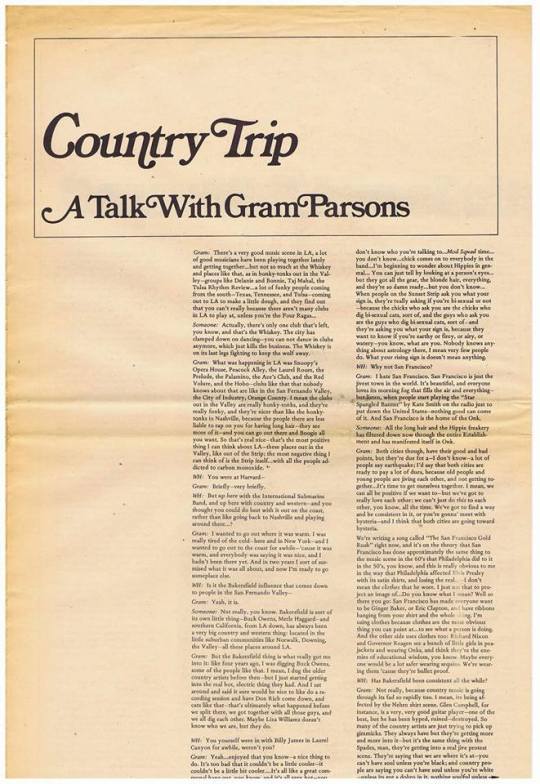
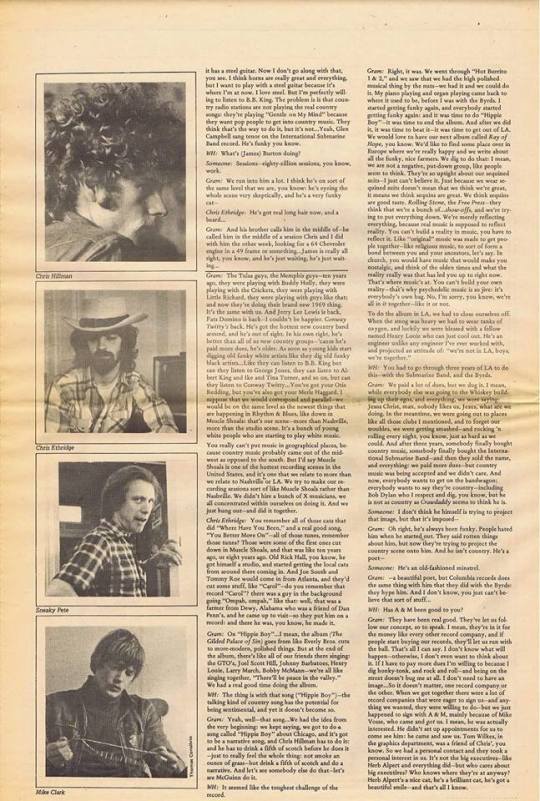
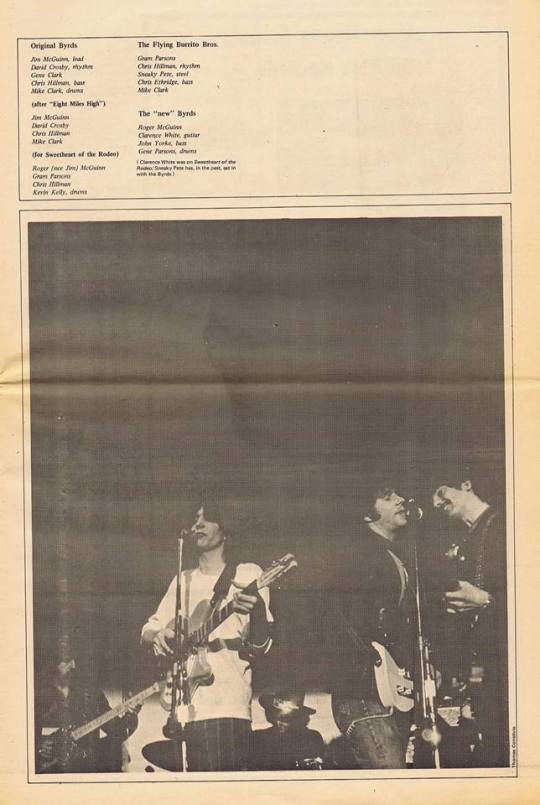
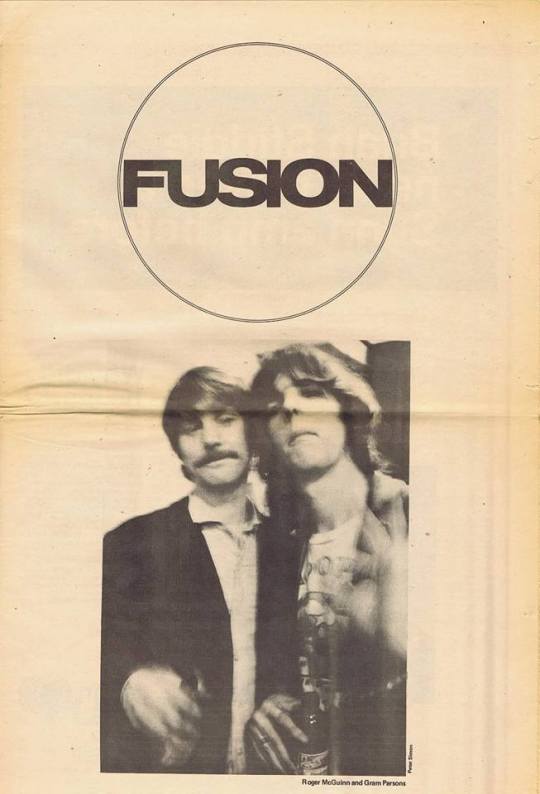
Country Trip: A Talk With Gram Parsons
Fusion magazine, March 26 1969 {x} transcript ↓
Gram: "There's a very good music scene in L.A., a lot of good musicians have been playing together lately and getting together... but not so much at the whiskey and places like that, as in honky-tonks out in the valley - groups like Delanie and Bonnie, Taj Mahal, the Tulsa Rhythm Review... a lot of funky people coming from the south - Texas, Tennessee, and Tulsa - coming out to L.A. to make a little dough, and they find out that you can't really because there aren't many clubs in L.A. to play at, unless you're the Four Ragas...
Someone: "Actually, there's only one club that's left, you know, and that's the Whiskey. The city has clamped down on dancing - you can not dance in clubs anymore, which just kills the business. The Whiskey is on its last legs fighting to keep the wolf away."
Gram: "What was happening in L.A. was Snoopy's Opera House, Peacock Alley, the Laurel Room, the Prehade, the Palamino, the Ace's Club and the Red Volure, and the Hobo - clubs like that that nobody knows about that are like in the San Fernando Valley, the City of Industry, Orange County, I mean the clubs out in the Valley are really honky-tonks, and they're really funky, and they're nicer than like the honky-tonks in Nashville, because the people there are less liable to rap on you for having long hair - they see more of it - and you can go out there and Boogie all you want. So that's real nice - that's the most positive thing I can think of about L.A. - these places out in the Valley, like out on the Strip itself... with all the people addicted to carbon monoxide."
WH: "You were at Harvard-"
Gram: "Briefly - very briefly."
WH: "But up here with the International Submarine Band, and up here with country and western - and you thought you could do best with it out on the coast, rather than like going back to Nashville and playing around there...?"
Gram: "I wanted to go out where it was warm. I was really tired of the cold - here and in New York - and I wanted to go out to the coast for awhile - 'cause it was warm, and everybody was saying it was nice, and I hadn't been there yet. And in two years I sort of surmised what it was all about, and now I'm ready to go someplace else."
WH: "Is it the Bakersfield influence that comes down to people in the San Fernando Valley-"
Gram: "Yeah, it is."
Someone: "Not really, you know. Bakersfield is sort of its own little thing - Buck Owens, Merle Haggard - and southern California, from L.A. down, has always been a very big country and western thing: located in the little suburban communities like Norwalk, Downing, the Valley - all those places around L.A."
Gram: "But the Bakersfield thing is what really got me into it: like four years ago, I was digging Buck Owens, some of the people like that. I mean, I dug the older country artists before then - but I just got started getting into the real hot, electric thing they had. And I sat around and said it sure would be nice to like do a recording session and have Don Rich come down, and cats like that - that's ultimately what happened before we split there, we got together with all those guys, and we all dig each other. Maybe Liza Williams doesn't know who we are, best they do."
WH: "You yourself were in with Billy James in Laurel Canyon foe awhile, weren't you?"
Gram: "Yeah... enjoyed that you know - a nice thing to do. It's too bad that it couldn't be a little cooler - it couldn't be a little bit cooler... It's all like a great [illegible sentence] don't know who you're talking to... Mod Squad time... you don't know... chick comes on to everybody in the band... I'm beginning to wonder about Hippies in general... You can just tell by looking at a person's eyes... but they got all the gear, the blonde hair, everything, and they're so damn ready... but you don't know... When people on Sunset Strip ask you what your sign is, they're really asking if you're bisexual or not - because the chicks who ask you are the chicks who dig bisexual cats, sort of, and the guys who ask you are the guys who dig bisexual cats, sort of - and and they're asking you what your sign is, because they want to know if you're earthy or firey, or airy, or watery - you know, what are you. Nobody knows anything about astrology there, I mean very few people do. What your rising sign is doesn't mean anything."
WH: "Why not San Francisco?"
Gram: "I hate San Francisco. San Francisco is just the jivest town in the world. It's beautiful, and everyone loves its morning fog that fills the air and everything - but listen, when people start playing the 'Star Spangled Banner' by Kate Smith on the radio just to put down the United States - nothing good can come of it. And San Francisco is the home of the Onk."
Someone: "All the long hair and the Hippie freakery has filtered down no through the entire Establishment and has manifested itself in Onk."
Gram: "Both cities though, have their good and bad points, but they're due for a - I don't know - a lot of people say earthquake; I'd say that both cities are ready to pay a lot of dues, because old people and young people are jiving each other, and not getting together... It's time to get ourselves together. I mean, we can all be positive if we want to - but we've got to really love each other; we can't just do this to each other, you know, all the time. We've got to find a way and be consistent in it, or you're gonna meet with hysteria - and I think that both cities are going toward hysteria.
We're writing a song called 'The San Francisco Gold Rush' right now, and it's on the theory that San Francisco has done approximately the same thing to the music scene in the 60's that Philadelphia did to the 50's, you know, and this is really obvious to me the way that Philadelphia affected Elvis Presley with its satin shirts, and losing the real... I don't mean the clothes that he wore. I just use that to project an image of... Do you know what I mean? Well so there you go; San Francisco has made everyone want to be Ginger Baker, or Eric Clapton, and have ribbons hanging from your shirt and the whole thing. I'm using clothes because clothes are the most obvious thing you can point at... to see what a person is doing. And the other side uses clothes too; Richard Nixon and Governor Reagan see a bunch of little girls in peajackets and wearing Onks, and they think they're the enemies of educational wisdom, you know. Maybe everyone would be a lot safer wearing sequins. We're wearing them 'cause they're bullet proof."
WH: Has Bakersfield been coaslatent all the while?
Gram: "Not really, because country music is going through its fad so rapidly too. I mean, its being affected by the Nehru shirt scene, Glen Campbell, for instance, is a very, very good guitar player - one of the best, but he has been hyped, ruined - destroyed. So many of the country artists are just trying to pick up gimmicks. They always have but they're getting more and more into it - but the same thing with the spades, man, they're getting into a real jive protest scene. They're saying that we are where it's at - you can't have soul unless you're black; and country people are saying you can't have a soul unless you're white unless its one a [illegible word] in it, nothing [illegible word] unless it has a steel guitar. Now I don't go along with that, you see. I think horns are really great and everything, but I want to play with a steel guitar because it's where I'm at now. I love steel. But I'm perfectly willing to listen to B.B. King. The problem is that country radio stations are not playing the real country songs: they're playing "Gentle on My Mind" because they want pop people to get into country music. They think that's the way to do it, but it's not... Yeah, Glen Campbell sang tenor on the International Submarine Band record. He's funky you know."
WH: "What's (James) Burton doing?"
Someone: "Sessions - eighty zillion sessions, you know, work."
Gram: "We run into him a lot. I think he's on sort of the same level that we are, you know; he's eyeing the whole scene very skeptically, and he's a very funky cat-"
Chris Ethridge: "He's got real long hair now, and a beard..."
Gram: "And his brother calls him in the middle of - he called him in the middle of a session Chris and I did with him the other week, looking for a 64 Chevrolet engine in a 49 frame or something... James is really all right, you know, and he's just waiting, he's just waiting..."
Gram: "The Tulsa guys, the Memphis guys - ten years ago, they were playing with Buddy Holly, they were playing with the Crickets, they were playing with Little Richard, they were playing with guys like that; and now they're doing their brand new 1969 thing. It's the same with us. And Jerry Lee Lewis is back, Fats Domino is back - I couldn't be happier. Conway Twitty's back. He's got the hottest new country band around, and he's out of sight. In his own right, he's better than all of us new country groups - 'cause he's paid more dues, he's older. As soon as young kids start digging old funky white artists like they dig old funky black artists... Like they can listen to B.B. King but can they listen to George Jones, they can listen to George Jones, they can listen to Albert King and Ike and Tina Turner, and so on, but can they listen to Conway Twitty... You've got your Otis Redding, but you've also got your Merle Haggard. I suppose that we would correspond and parallel - we would be on the same level as the newest things that are happening in Rhythm & Blues, like down in Muscle Shoals that's our scene. It's a bunch of young white people who are starting to play white music.
You really can't put music in geographical places, because country music probably came out of the Midwest as opposed to the south. But I'd say Muscle Shoals is one of the hottest recording scenes in the United States, and it's one that we relate to more than we relate to Nashville or L.A. We try to make our recording sessions sort of like Muscles Shoals rather than Nashville. We didn't hire a bunch of X musicians, we all concentrated within ourselves on doing it. And we just hung out - and did it together.
Chris Ethridge: "You remember all of those cats that did 'Where Have You Been,' and a real good song, 'You Better Move On' - all of those tunes, remember those tunes? Those were some of the first ones cut down in Muscle Shoals, and that was like ten years ago, or eight years ago. Old Rick Hall, you know, he got himself a studio, and started getting the local cats from around there coming in. And Joe South and Tommy Roe would come in from Atlanta, and they'd cut some stuff, like 'Carol' - do you remember that record 'Carol'? there was a guy in the background going 'Ompah, ompah,' like that; well, that was a farmer from Dewy, Alabama who was a friend of Dan Penn's, and he came up to visit - so they put him on a record; and there he was, you know, he made it.
Gram: "On 'Hippie Boy' ...I mean, the album (The Gilded Palace of Sin) goes from like Everly Bros. cuts to more modern, polished things. But at the end of the album, there's like all of our friends there singing: the GTO's, Joel Scott Hill, Johnny Barbatoes, Henry Louie, Larry March, Bobby McMann - we're all like singing together, 'There'll be peace in the valley.' We had a real good time doing the album.
WH: "The thing is with that song ('Hippie Boy') - the talking kind of country song has the potential for being sentimental, and yet it doesn't become so."
Gram: "Yeah, well - that song - We had the idea from the very beginning; we kept saying, we got to do a song called 'Hippie Boy' about Chicago, and it's got to be a narrative song, and Chris Hillman has to do it; and he has to drink a fifth of scotch before he does it - just to really feel the whole thing; not smoke an ounce of grass - but drink a fifth of scotch and do a narrative. And let's see someone else do that - let's see McGuinn do it."
WH: "It seemed like the toughest challenge of the record."
Gram: "Right, it was. We went through 'Hot Burrito 1 & 2,' and we saw that we had the high polished musical thing by the nuts - we had it and we could do it. My piano playing and organ playing came back to where it used to be, before I was with the Byrds. I started getting funky again, and everybody started getting funky again; and it was time to do 'Hippie Boy' - It was time to end the album. And after we did it, it was time to beat it - it was time to get out of L.A. We would love to have our next album called 'Ray of Hope', you know. We'd like to find some place over in Europe where we're really happy and we write about all the funky nice farmers. We dig to do that; I mean, we are not a negative, put-down group, like people seem to think. They're so uptight about our sequined suits - I just can't believe it. Just because we wear sequined suits doesn't mean that we think we're great. It means we think sequins are great. We think sequins are good taste. Rolling Stone, the Free Press - they think that we're a bunch of... show offs, and we're trying to put everything down. We're merely reflecting everything, because real music is supposed to reflect reality. You can't build a reality in music, you have to reflect it. Like 'original' music was made to get people together - like religious music, to sort of form a bond between you and your ancestors, let's say. In church, you would have music that would make you nostalgic, and think of the oldies times and what the reality really was that has led you up to right now. That's where music's at You can't build your own reality - that's why psychedelic music is so jive; it's every a everybody's own bag. No, I'm sorry, you know, we're all in it together - like it or not.
To do the album in L.A., we had to close ourselves off. When the smog was heavy we had to wear tanks of oxygen, and luckily we were blessed with a fellow named Henry Louie who can just cool out. He's an engineer unlike any engineer I've ever worked with, and projected an attitude of; 'we're not in L.A. boys, we're together.'"
WH: "You had to go through three years of L.A. to do this - with the Submarine Band, and the Byrds."
Gram: "We paid a lot of dues, but we dug it. I mean, while everybody else was going to the Whiskey building up their egos, and everything, we were saying; 'Jesus Christ, man, nobody likes us. Jesus, what are we doing'. In the meantime, we were going out to places like all those clubs I mentioned, and to forget our troubles, we were getting smashed - and rocking 'n rolling every night, you know, just as hard as we could. And after three years, somebody finally bought country music, someone finally bought the Internal Submarine Band - and then they sold the name, and everything; we paid more dues - but country music was being accepted and we didn't care. And now, everybody wants to get on the bandwagon; everybody want to say they're country as Crawdaddy seems to think he is."
Someone: "I don't think he himself is trying to project that image, but that it's imposed-"
Gram: "Oh right, he's always been funky. People hated him when he started out. They said rotten things about him, but now they're trying to project the country scene onto him. And he isn't country. He's a poet-"
Someone: "He's and old fashioned minstrel."
Gram: - "a beautiful poet, but Columbia records does the same thing with him that they did with the Byrds; they hype him. And I don't know, you just can't believe that sort of stuff..."
WH: "Has A & M been good to you?"
Gram: "They have been real good. They've let us follow our concepts, so to speak. I mean, they're in it for the money like every other record company, and if people start buying out records, they'll let us run with the ball. That's all I can say. I don't know what will happen - otherwise, I don't even want to think about it. If I have to pay more dues I'm willing to because I dig honky-tonk, and rock and roll - and being on the street doesn't bug me at all. I don't need to have an image... So it doesn't matter, one record company or the other. When we got together there were a lot of record companies that were eager to sign us - and anything we wanted, they were willing to do - but we just happened to sign with A & M, mainly because of Mike Vosse, who came and got us. I mean, he was actually interested. He didn't set up appointments for us to come and see him; he came and saw us. Tom Wilkes, in the graphics department, was a friend of Chris', you know. So we had a personal contact and they took a personal interest in us. It's not the big executives - like Herb Alpert and everything did - but who cares about big executives? Who knows where they're at anyway? Herb Alpert's a nice cat, he's a brilliant cat, he's got a beautiful smile - and that's all I know."
#gram parsons#the byrds#the flying burrito brothers#the gilded palace of sin#country music#60s#let me know if you want me to transcribe this#edit: ahh !! he talks about bisexuality !!!! and calls everyone funky and cats#chris hillman and the hippie boy song#i typed out 3160 words and it was worth it
44 notes
·
View notes
Text
Album of the Week #73
The Gilded Palace of Sin
(1969)
by The Flying Burrito Brothers
Overall Rating: 9/10
TL;DR: This is it. This is the peak of country rock. There is no beating this.
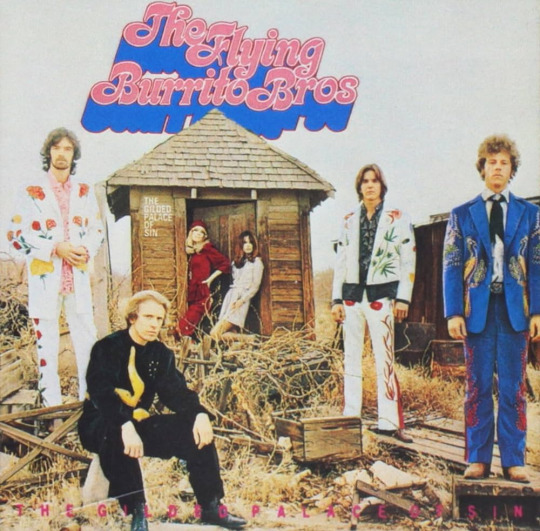
(Can we talk about how bitchin this album name is? oh the cover? font and suits are cool the rest is just meh 7/10)
Overall Thoughts
In December 2022 I reviewed The Flying Burrito Brothers’ third album (named after themselves) and thought that the album was just okay, so I was curious what their masterpiece that everyone hailed them for could possibly sound like. More country rock? More side guitar? Forlorn country singing? Well yes and no.
Yes this is country rock, but this is in my opinion the best it could ever get. This is a prime model for how incredible country rock can be, and it is amazing to me that this was their debut! Instead of slide guitar being the signal that this is a country song, there is a saloon piano, an acoustic keeping the key, and woah wait, electric guitar? In almost every song the lead guitar is just doing whatever he wants, riffing to his hearts content and the passion is contagious. And if that wasn’t rock enough for you, there is some crazy distortion in “Wheels” and “Hot Burrito #2” that totally throws you off. You were in Back to the Future Part III when suddenly the present wants to sneak in. It’s moments like that which keep you into the album, not just sitting and hoping there will be a guitar solo.
I feel like this is coming across as me hating country music, which I don’t really? I’m one of those people that says they only like old country, and this is definitely that. Saloon piano and upright bass aside, the vocals in this are an absolute marvel of the genre. Every single song from verse to chorus includes harmonies of the two lead singers (Gram Parsons on the left and Chris Hillman on the right, both from the Byrds) work together to fully immerse you in each song. Both sing with such rich vibrato, able to convey that distinct country feeling of yearning, nostalgia, and defeat, toeing the line of melodrama but never crossing it. With anti-Vietnam and pretty liberal lyrics, its a fascinating mix of cultures at the time.
My favorite songs were the creatively named “Hot Burrito #1” and the closer “Hippie Boy.” The first is the only solo song of Mr. Right Headphone, and brings the bass front and center. Bringing the bass to the front was not super common for the era too, and I can’t think of a country song that hinges so much on just piano and bass. The second is one of those “gather ‘round and let me tell you a story about the bad government” à la “Alice’s Restaurant.” This one may be more preachy and less meandering, but I found it endearing and its simplicity incredibly well done. Its message of a unified country of happy people is a little idealist, but if you are the creators of a whole incredible genre I’ll give you a bit of a pass.
Next week's review: Canned Wheat (1969) by The Guess Who
#album 73#album of the week#album review#music review#album recommendation#music recommendation#classic rock#country rock#the flying burrito brothers#the byrds
0 notes
Photo






The Byrds-Monkees Connection: or The Many Similarities Between Two Iconic Pop-Rock Bands
Both bands formed in Hollywood
Both have members who come from showbiz families (David Crosby and Micky Dolenz)
Both have curly-haired members who straightened their hair for the first year of formation (Chris Hillman and Micky Dolenz)
Both have members who were alumni of the Greenwich Village folkie scene (Roger McGuinn and Peter Tork [Chris Hillman, Gene Clark, David Crosby and Mike Nesmith also started their careers with folk music, but weren’t in NYC])
The drummers of both bands didn’t know how to play their instruments before being hired (Michael Clarke and Micky Dolenz)
Neither bassists were playing bass before joining the bands (Chris Hillman and Peter Tork)
Both lead guitarists of each band have habits of wearing sunglasses indoors often, and yet, miraculously don’t look like douchebags (Roger McGuinn and Mike Nesmith)
Both bands’ first hit single featured the instrumental tracks played entirely by session musicians (’Mr. Tambourine Man’ and ‘Last Train to Clarksville’ [don’t @ me about Roger getting to play guitar on MTM, he still counts as a session player])
Both had songs composed for them by legendary female singer-songwriters (Jackie DeShannon and Carole King)
Both feature members who would go on to be considered pioneers in penning the country-rock subgenre (Roger McGuinn, Chris Hillman, [Gram Parsons] and Mike Nesmith)
Both bands sacked their best album producer way too soon (Terry Melcher and Chip Douglas)
Both bands’ guitarists have prominent Christian backgrounds (Roger McGuinn and Mike Nesmith)
Both have two members who were huge ass hippy-dippy flower children who did a lottttt of drugs and had a lottttttttt of sex (David Crosby and Peter Tork)
Both have guitarists who don’t have time for your shit (Roger McGuinn and Mike Nesmith [wow, were these 2 separated at birth or something])
Both bands fought being labeled ‘manufactured’ with their public images [especially the Monkees, obvs]
Both bands are constantly compared to the Beatles [and both have admitted to being directly inspired by them artistically]
Both have intentional misspellings in their band names [another Beatle influence]
Both bands are named after animals
Both participated in counter-culture cult films produced by Raybert Productions (Easy Rider and Head)
A lot of each band’s classic songs are covers or written for them by other people
Both have members who are pretty boys with great hair and most popular with the fangirls (Gene Clark and Davy Jones)
#the monkees#The Byrds#classic rock#trivia#classic rock trivia#y'all thought the monkees were going to be my 2019 obsession#well now the byrds are too#feel free too add on to the list!#i'm sure i missed some#ps. there are a lot of byrds references in my fanfic hint hint#faves
70 notes
·
View notes
Photo



Hipsterville Hillbilly Hoedown An Eclectic Mix of Rock Music Influenced by Country, Folk, Bluegrass, & Other Old Timey Shit
Well you know, it’s a shame and a pity you were raised up in the city and you never learned nothin’ ’bout country ways… – Country Joe McDonald
Us good ol’ boys down at Wub-Fur Internet Radio never like to let a good bandwagon pass us by (even when it’s driven by Ken Burns). So if y’all wouldn’t mind, hold our beer while we jump on this one and present these 21 foot stompin’, barn burnin’, hootenanny-ready tunes for to educate all y’all city folk to country ways. Featuring the gitar pickin’, fiddle playin’, mandolin strummin’ and other assorted musical talents of the Flying Burrito Brothers, Uncle Tupelo, The Nitty Gritty Dirt Band, Jonboy Langford and The Pine Valley Cosmonauts, Dillard and Clark, Laura Cantrell, Chris Hillman, Vassar Clements, and a dozen more acts who know that California hippies and Chicago hipsters can play country music just as good as real hillbillies.
Dedicated with apologies to the late Gram Parsons. Apologies also to Patti Smith, Mick Jagger & Keith Richards, and the Joshua Tree National Monument.
Photo Credits: Front: Rick Loomis | Back: Michael Cooper
Play on 8tracks | Play on Mixcloud (or scroll down to use one of the embedded players below)
Running Time: 1 hour, 13 seconds
Tracklist
Tulsa County (2:39) — Rising Sons | Los Angeles | 1965
Sing Me Back Home (3:12) — Nashville West | California | 1967
Runways of the Moon (4:22) — Muleskinner | Los Angeles | 1973
Old and in the Way (3:00) — Old and in the Way | San Francisco | 1975
Peking Fling (2:53) — Vassar Clements | Florida | 1975
Still Feeling Blue (Alternate Version) (2:37) — Gram Parsons | Los Angeles | 1973
No Depression (2:19) — Uncle Tupelo | Chicago | 1990
Sin City (4:08) — The Flying Burrito Brothers | Los Angeles | 1969
Faretheewell (2:56) — The Hillmen | Los Angeles | 1964
Sonic Bummer (2:16) — Gene Parsons | California | 1973
Mule Skinner Blues (1:38) — David Grisman | California | 1999
Wabash Cannonball (2:00) — The Nitty Gritty Dirt Band | Long Beach, CA | 1972
Guess Things Happen That Way (3:02) — Jonboy Langford and The Pine Valley Cosmonauts | Chicago | 1995
I Want to Sing That Rock and Roll (2:36) — Gillian Welch | Nashville | 2001
No Longer a Sweetheart of Mine (3:12) — Dillard and Clark | Los Angeles | 1969
Pretty Polly (2:32) — The Sadies | Toronto | 1998
A Song for You (4:30) — Continental Drifters | Los Angeles / Louisiana | 1994
Roll Truck Roll (2:35) — Laura Cantrell | New York City | 1996
1,000,001 (2:38) — Kelly Hogan | Georgia / Chicago | 2002
Wildflowers (2:47) — Chris Hillman | Los Angeles | 2017
Close Up the Honky Tonks (2:21) — The Flying Burrito Brothers | Live in San Francisco | 1969
Embedded Mixcloud Player
Embedded 8tracks Player
0 notes